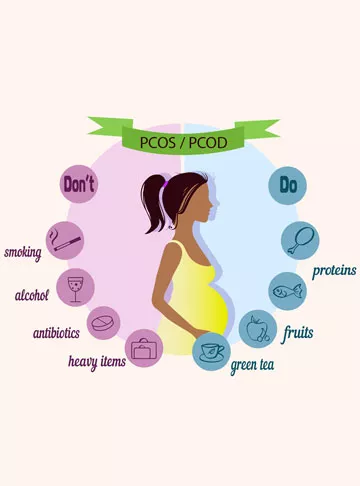Polycystic Ovary Syndrome (PCOS), also known as Polycystic Ovary Disorder (PCOD), is a common endocrine disorder among women of reproductive age. It can manifest with various symptoms, varying in severity from person to person. The best doctor for PCOD treatment specializes in endocrinology or gynecology, with extensive experience in managing hormonal disorders and reproductive health. Look for a healthcare provider who offers personalized care tailored to your specific needs and concerns regarding PCOD.
Ten Common Symptoms of PCOD
- Irregular Menstrual Cycles: One of the hallmark symptoms of PCOD is irregular periods. Women with PCOD may experience infrequent periods, prolonged menstrual cycles, or unpredictable bleeding patterns.
- Ovulation Irregularities: PCOD often disrupts the normal ovulation process, leading to irregular or absent ovulation. This can result in fertility issues and difficulty conceiving.
- Excessive Androgen Levels: Elevated levels of androgens (male hormones), such as testosterone, may be present in women with PCOD. This hormonal imbalance can cause symptoms such as acne, hirsutism (excessive hair growth), and male-pattern baldness or thinning of hair.
- Polycystic Ovaries: While not all women with PCOD have ovarian cysts, the condition is characterized by multiple small cysts on the ovaries. These cysts are often detected during ultrasound examinations.
- Weight Gain: Many women with PCOD struggle with weight management. Insulin resistance, common in PCOD, can lead to weight gain, especially around the abdomen.
- Insulin Resistance: PCOD is often associated with insulin resistance, a condition in which the body's cells become less responsive to insulin. Insulin resistance can lead to high blood sugar levels and an increased risk of type 2 diabetes.
- Skin Problems: Hormonal imbalances associated with PCOD can contribute to skin issues such as acne, oily skin, and dark patches, especially along the neck creases, groin, and underneath breasts (acanthosis nigricans).
- Hair Issues: Excess androgens in PCOD can cause hirsutism, which is the growth of coarse, dark hair in areas where men typically grow hair, such as the face, chest, and back. Conversely, some women may experience hair thinning or hair loss on the scalp (androgenic alopecia).
- Mood Swings and Depression: Hormonal fluctuations in PCOD can affect mood and contribute to symptoms of depression, anxiety, irritability, and mood swings.
- Metabolic Syndrome: PCOD increases the risk of developing metabolic syndrome, a cluster of conditions that include high blood pressure, high blood sugar levels, abnormal cholesterol levels, and excess abdominal fat, all of which significantly increase the risk of heart disease and type 2 diabetes.
It's essential to note that not all women with PCOD will experience all of these symptoms, and the severity of symptoms can vary widely among individuals. Additionally, the diagnosis of PCOD is typically made based on a combination of symptoms, physical examination, blood tests, and ultrasound findings. If you suspect you have PCOD or are experiencing any of these symptoms, it's essential to consult with a healthcare professional for proper evaluation and management.





Comments